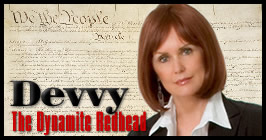By:
Devvy
December 8, 2012
NewsWithViews.com
Taking on the IRS is not something most people would do simply because they're the American version of the Nazi Gestapo. That includes attorneys who work for the IRS. They aren't stupid. They can read, but they sure as hell care absolutely nothing for the law or the U.S. Constitution. The only thing U.S. attorneys who prosecute income tax cases care about is job security, their federal paycheck and retirement benefits.
Let's not forget the gutless males and females who sit on the bench in federal court rooms all across this country who protect the big lie about the federal income tax. Like IRS employees and attorneys, those judges are nothing more than parasites who feed off the host. There is no honor in protecting a lie - especially one that has been so destructive to the American people.
My dear friend and attorney in our 'smart' meter fight here in Texas, Tommy Cryer, took on the IRS in a big way. The federal Gestapo charged him with several tax "crimes." Two felony tax evasion and two willful failure to file returns. Eventually, the government dropped the two felony tax evasion charges. After all the gut wrenching involved in being a defendant in federal court, the case went to the jury. Tommy was quitted 12-0. But, he paid the ultimate price. Between trying to handle his private practice case load and the unbelievable stress involved with the trial over years, Tommy died in his sleep, June 4, 2012. He had two prior bad heart attacks. Along with some other serious health issues, likely, his heart gave out for good and America lost a true American patriot. Gone, but not forgotten.
Like Joe Banister and other defendants caught in the fangs of the gangsters at the IRS, Tommy could not argue the merits of his case. He was only able to argue his belief that he wasn't subject to the tax and that there was no criminal intent on his part. You see, the corrupt federal courts will not let you argue the misapplication of the income tax. They call it frivolous based on a long list of court cases kicked by rotten judges. Most are convicted by juries of lemmings who have zero understanding of the subject matter.
Dedicated attorneys and regular Americans have been fighting this longer than I've been alive. Between the propaganda dished out by ignorant asses who represent the "mainstream" media and cable networks, lying politicians from both parties who serve in the Outlaw Congress and Gestapo enforcement by the IRS, 99% of the American people don't just believe we are all subject to the tax, they're down right terrified of even questioning it. Fear is and has been the only driving force behind the big lie.
Well, it appears the U.S. Supreme Court might actually "allow" one American to argue the "merits of the case" as they say in the legal world. Jeff Maehr, a resident of Colorado, has been in and out of court rooms for years in his battle to force a federal court to stop ignoring the law as it's written and stop shoving people like him out the door tagged as nothing more than protesters with frivolous filings. Let me tell you something, it costs a lot of money to file those cases and even more to fight them. There's nothing frivolous about any American challenging any law that is being misapplied. Rather it is our duty and obligation to do so, otherwise, tyranny continues to creep to your front door.
Reaching the end of the road with appeals courts, Jeff filed a Writ of Certiorari with the U.S. Supreme Court. Most would consider it a million to one long shot because that court receives about 10,000 cases a year, but only hears 75-80 for oral arguments. That alone should tell you how screwed up the federal courts are when they can't even interpret the law from one circuit to another.
If the U.S. Supreme Court grants a writ of certiorari, it only means that at least four of the justices have determined that the circumstances described in the petition are enough for a review by the court. What's called the "rule of four" granting certiorari is enough to place the case on the court's calendar.
Now, here's where it gets interesting and perhaps a bit confusing. The U.S. Supreme Court docketed Jeff's case on a very famous date: September 11, 2012.
On September 26, 2012, Jeff received a response letter from the DOJ/Solicitor General, Donald Verrilli, Jr., stating "The government hereby waives its right to file a response to the petition in this case, unless requested to do so by the Court." You can view that document here. Typical of sloppy work, Jeff's last name is spelled wrong on that document.
Jeff turned right around and filed a Notice of Default Filing on November 6, 2012.
Regarding the default, this is Jeff's position:
"Rule 55. Default; Default Judgment
(a) ENTERING A DEFAULT. When a party against whom a judgment for affirmative relief is sought has failed to plead or otherwise defend, and that failure is shown by affidavit or otherwise, the clerk must enter the party's default.
"In denying to respond and defend against my suit, the IRS, defaulted. However, as the Rule 55 above mentions, and as other sources have elaborated on, their refusal to answer IS an answer. That answer is, "we do not deny anything you are saying," and thereby they agree to it all. This means the court is deprived of subject matter jurisdiction because the parties have agreed and settled the controversy, and "should," by law, give judgment against them on all counts, and allow me remedy. Their acceptance of my writ and docket of it under case # 12-6169, was an acceptance... a contract with them to perform their lawful duty, so in effect, the case WAS accepted to be heard.
"It is likely I didn't have to file the last documents, but it is better to do more than less. I will now prepare another documents titled "Motion for ORDER to Intervenor the United States Government Solicitor General, Counsel of Record, Donald B. Verrilli, Jr."
In the meantime, something else was also going on with another submission by Jeff. This one is for what is called a forma pauperis application - meaning the petitioner does not have any money to pay the enormous costs of a docket fee ($300.00) and all the copies required by the court to submit a completely new writ. One has to wonder why since the court had already docketed his case. I don't think many people realize just how expensive it is because the "new" writ has to be professionally printed and bound with costs close to $2,000. The first application was denied, but a reconsideration by the court was scheduled for December 7, 2012.
As Jeff conveyed to me on the phone: Why do they need a new writ when the substance is already in the first writ he filed that was accepted? Ah, more rules!
Jeff's motion for reconsideration of the forma pauperis application is a well put argument. Both the Notice of Default Filing and Motion for Reconsideration of the Forma Pauperis Application can be read here. Jeff also filed an application for more time since he doesn't have the money; that was granted to February 17, 2013.
I'm also not a lawyer, but I can read and found this:
Opposing Certiorari in the U.S. Supreme Court
"If you believe that the petition for certiorari in your case will receive this dismissive treatment, compare notes with lawyers who are farther removed from the case and who have had the opportunity to develop a "feel" for certworthiness. Have an experienced Supreme Court practitioner, a past law clerk, or an alum of the Solicitor General's office read the opinion below and the petition. If there is general agreement that the petition is obviously meritless, talk to your client about whether the time and expense of preparing and printing a brief in opposition is warranted. No rule requires that the respondent file a brief in opposition (except cases, see Rule 15.1). If the petition in your case is so plainly meritless that the Court will not need the assistance of a brief in opposition, you may wish to waive your response. The solicitor general and state attorneys general often do this.
"One way to waive is simply to allow the period for response to elapse without filing a brief. A much more helpful and courteous course is to write a letter to the clerk (be sure to serve it on opposing counsel). It should say something such as "because this case clearly does not warrant review by the Supreme Court, respondent does not intend to respond to the petition for certiorari unless requested to do so by the Court." Such a letter tells the Clerk that respondent received service and identifies respondent's counsel of record. See Rule 9.
"The Clerk prefers a respondent to file its waiver letter as soon as possible after receipt of the petition. That is because the clerk may circulate the petition to the justices immediately after receiving the waiver letter, instead of waiting until the time for response expires. Rule 15.5. This may be an important factor if you want to move rapidly to enforce a judgment in your favor — especially when a Court recess looms. For example, when a petition is filed close to the long summer recess, quickly filing a waiver can reward you with a June denial of certiorari and avoid the long wait until the first October order list.
"Waiving response displays the proper disdain for a frivolous petition. And it is not the risk one might imagine: A respondent can be sure of an opportunity to file a brief in opposition if the justices surprisingly do find something of interest in the case. A summary of the Court's current procedures for handling certiorari petitions shows why, but it also shows that a waiver must be approached with care."
In Jeff's case, the respondent, IRS, is represented by the U.S. Solicitor General who represents the government in cases before the U.S. Supreme Court. Does that mean the respondent has defaulted under Rule 55 or did the U.S. Solicitor General simply do what is custom when the respondent feels a case won't be accepted by the court because it is without merit?
If you go look at Rule 15.1 as cited above, it says "A brief in opposition for a writ of certiorari may be filed by a respondent in any case, but is not mandatory except in a capital case."
So, I don't believe the respondent is in default, but we will know when Jeff receives a response on that issue.
As I said, it's remarkable that his case was even accepted and docketed at all when you consider (numbers vary) up to 10,000 writs are filed every year with the court hearing less than 100. First, because Jeff is representing himself, and second, because of the issues he raises before the court about the definition of income and and a whole litany of questions placed before the court. If this ever gets to submitting briefs and oral arguments, the crooked, lying politicians in the Outlaw Congress will be sweating bullets.
All the Supreme Court filings with the court are here.
I feel confident in saying that as soon as the IRS and U.S. Solicitor General found out Jeff's case was docketed, it must have sent major shock waves. Instead of expecting the usual 'denied' issued by the Supreme Court for tax cases, four Supreme Court Justices feel the case has enough merit to docket.
Jeff is trying to raise the money for the fees and printing requirements I described above. Should his case go to oral arguments, he would need to travel to Washington, DC. That is expensive; I know. I haven't ask him if he would argue the case himself, but I don't think that would be wise or even necessary. If Jeff is granted forma pauperis status, under Rule 39 of the U.S. Supreme Court, the court can appoint an attorney for him. However, if the case goes to oral arguments, I think it's safe to day a dozen qualified constitutional attorneys would be more than interested in arguing his case in front of the U.S. Supreme Court pro bono (without charge).
You can send donations via pay pal or directly to: Jeff Maehr, P.O. Box 2923, Pagosa Springs, CO 81147
The only way people are going to understand they've been lied to their whole lives about the federal income tax is to study the law as it's written. Jeff has a 23-page document titled, What Is Income? posted on his site.
| Subscribe to the NewsWithViews Daily News Alerts! |
Before he died, Tommy Cryer, was gaining ground in his petition in the United States Tax Court. Wikipedia actually got all the facts correct in their posting about his trial and subsequent actions. We had many long discussions about what he had been firing back to government attorneys. He really was running them in circles. After several delays, the trial was to be in October 2012. Sadly our dear friend passed away in June. But, he left one of the most important documents ever written about the misapplication of the federal income tax against you and me. If every adult aged American who actually is forced to pay income taxes read that document, there would be such an uproar by tens of millions of enraged people, the outlaws in the U.S. Congress would run for the hills.
As I said above, U.S. Attorneys and federal judges are not stupid. Foolish, corrupt, care nothing about their oath of office, but they're not stupid. Tommy Cryer's The Memorandum is a damning indictment of the lies and deception used against you and me. Don't let it continue to enslave your children and grand children.
� 2012 - NewsWithViews.com - All Rights Reserved
Devvy Kidd authored the booklets, Why A Bankrupt America and Blind Loyalty; 2 million copies sold. Devvy appears on radio shows all over the country. She left the Republican Party in 1996 and has been an independent voter ever since. Devvy isn't left, right or in the middle; she is a constitutionalist who believes in the supreme law of the land, not some political party.
Devvy's regularly posted new columns are on her site at: www.devvy.com. You can also sign up for her free email alerts.
E-mail is: devvyk@npn.net













 Share
This Article
Share
This Article







